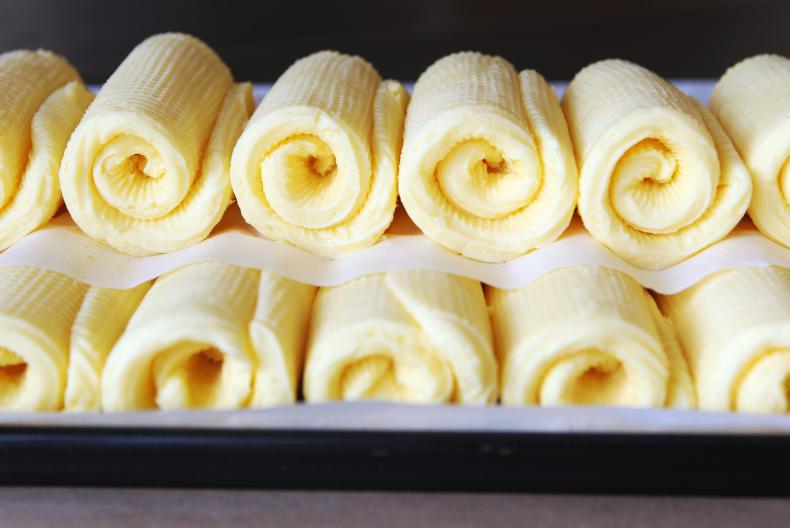The Irish Co-operative Organisation Society (ICOS) has warned that Irish dairy exports will be levied with tariffs amounting to €287m a year unless a trade agreement is reached between the EU and UK.
It comes after an announcement this afternoon by the UK government on its post-Brexit tariff regime.
UK Trade Secretary Liz Truss announced the new UK global tariff plan which will be applied on all imports following the UK’s exit from the EU customs unions and single market at the end of the year. Without a deal, Irish exporters will be subject to the tariffs.
Tariffs
Under the plan, there would be a duty of £139 (€155)/100kg on imports of cheddar cheese, while £158 (€177)/100kg would be applied to butter imports.
ICOS, which represents dairy co-ops, said the tariffs would impose a significant cost on agri-food businesses and severely hamper competitiveness in the UK market. Approximately 138,000t of cheese and 42,000t of butter were exported from Ireland to the UK in 2019.
The tariff bill for these exports would reach upwards of €287m, ICOS said.
Hits
ICOS EU affairs executive Alison Graham said: “The Irish dairy sector has taken hit after hit this year, with COVID-19 creating additional new barriers to international trade and imposing significantly higher costs on exporters, with the implications to be felt for months, if not years to come.
“On top of this, additional tariffs of 25% being applied on our dairy exports to the US, with a cost of more than €50 million for the dairy sector. Combined, these have already had a disturbing impact on the stability of the dairy sector and have meant substantial price drops for farmers whose produce is the building block of the entire industry.”
Graham said co-ops and farmers simply could not take another hit. The new economic and social challenges brought about by COVID-19 meant reaching a UK trade agreement must remain a top EU and national priority, she said.
“The announcement today is an unwelcome reminder of the urgency of the discussions and the importance of avoiding any distraction or complacency around this issue,” she concluded.
Read more
UK to maintain agricultural tariffs
Brexit stalemate
The Irish Co-operative Organisation Society (ICOS) has warned that Irish dairy exports will be levied with tariffs amounting to €287m a year unless a trade agreement is reached between the EU and UK.
It comes after an announcement this afternoon by the UK government on its post-Brexit tariff regime.
UK Trade Secretary Liz Truss announced the new UK global tariff plan which will be applied on all imports following the UK’s exit from the EU customs unions and single market at the end of the year. Without a deal, Irish exporters will be subject to the tariffs.
Tariffs
Under the plan, there would be a duty of £139 (€155)/100kg on imports of cheddar cheese, while £158 (€177)/100kg would be applied to butter imports.
ICOS, which represents dairy co-ops, said the tariffs would impose a significant cost on agri-food businesses and severely hamper competitiveness in the UK market. Approximately 138,000t of cheese and 42,000t of butter were exported from Ireland to the UK in 2019.
The tariff bill for these exports would reach upwards of €287m, ICOS said.
Hits
ICOS EU affairs executive Alison Graham said: “The Irish dairy sector has taken hit after hit this year, with COVID-19 creating additional new barriers to international trade and imposing significantly higher costs on exporters, with the implications to be felt for months, if not years to come.
“On top of this, additional tariffs of 25% being applied on our dairy exports to the US, with a cost of more than €50 million for the dairy sector. Combined, these have already had a disturbing impact on the stability of the dairy sector and have meant substantial price drops for farmers whose produce is the building block of the entire industry.”
Graham said co-ops and farmers simply could not take another hit. The new economic and social challenges brought about by COVID-19 meant reaching a UK trade agreement must remain a top EU and national priority, she said.
“The announcement today is an unwelcome reminder of the urgency of the discussions and the importance of avoiding any distraction or complacency around this issue,” she concluded.
Read more
UK to maintain agricultural tariffs
Brexit stalemate






 This is a subscriber-only article
This is a subscriber-only article










SHARING OPTIONS: